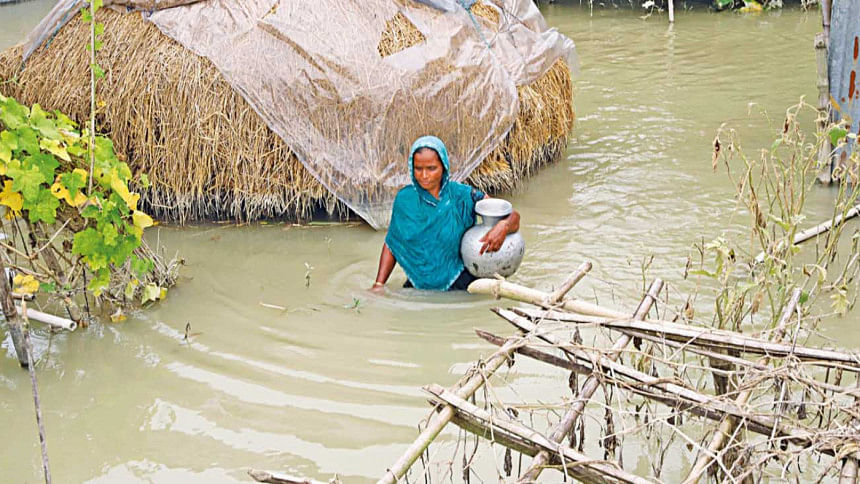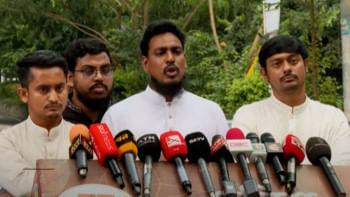Early action key to ending flood woes

There is a proverb which says, "misfortunes never come alone". Well that seems to be the case for communities living in northern Bangladesh-- marooned by monsoon floods and suffering through the impacts of the Covid-19 pandemic.
This year has broken all recent records of flooding. Nearly one-third of Bangladesh is inundated. And then there are some parts of south-west Bangladesh where people have been suffering from waterlogging since Amphan made landfall in late May 2020. According to the executive engineer of Flood Forecasting and Warning Centre (The Daily Star/ August 12, 2020) there is no immediate relief in sight for the marooned people. Water levels in different rivers of the country may rise again by the end of this month which may lead to fresh floods in some areas, adding to the woes of people.
For the dwellers of chars and haors, flood is an annual affair. Every year the floods arrive, bring devastation along. Humanitarian support arrives as well bringing some consolation. But nothing changes significantly until water recedes. Drowned for months, the land emerges again. Hordes of living skeletons teeter on this dead land to build a life again and the tale continues.
But the truth is, there is now scope for early action. Forecast based early action (FbA) entails prioritising pre-determined actions based on forecasts and triggers. Roles and responsibilities of disaster management institutions and communities are also clearly defined considering the nature and scale of the predicted flood. Early actions based on forecasts have ranged from bolstering organisational capacities and programme activity to delivering food and non-food relief items, stockpiling medicines, providing cash transfers and scaling up social protection mechanisms.
With financial support from European Commission, Supporting Flood Forecast-based Action and Learning in Bangladesh (SUFAL) Project led by CARE Bangladesh applied FbA mechanism to take early actions based on climate forecast to respond to the monsoon floods by supporting inundated households in Kurigram. The SUFAL team worked closely with local administration and disaster management committees to take community-level action which included protection of embankments and evacuation routes in most vulnerable locations, preparation of flood evacuation shelters and points, preparation of community-level water, sanitation and hygiene (WASH) points around evacuation spots, preparation of boats and trawlers for household wishing to evacuate, repair and installation of latrines, dissemination of forecasts and risk information, and cash support to most vulnerable households in high risk locations.
It is true that above NGO-led mechanism benefitted people living in a small part of Kurigram. However, Department of Disaster Management (DDM) under the Ministry of Disaster Management and Relief and other government functionaries can scale up FbA efforts in other parts of the country. If it is replicated in other vulnerable districts, it will benefit lives and livelihoods significantly.
While floods are natural, destruction by floods is not a natural phenomenon. It is mostly the product of human intervention and some development projects including unplanned dam construction are not any less responsible. Deforestation in the catchment area, building of human habitation on the river banks and in the floodplains area, encroachment on wetlands, changed cropping pattern and, ironically, quick-fix attempts at flood control are also responsible for the devastation caused by the monsoon floods.
According to a report in The Daily Star, the Government of Bangladesh (GoB) has taken up four projects costing Tk 8,000 crore to construct sustainable embankments to protect the lives and properties of people in the coastal areas of the southwestern part of Bangladesh. Citing Deputy Minister for Water Resources AKM Enamul Hoque Shameem, the report revealed that the government is actively considering formation of a "Coastal Development Board" like the one of Haor Development Board to address the problems in the coastal areas. In a separate interview with a leading online portal, he mentioned of initiating permanent projects for all vulnerable areas in phases. He also anticipated that coordinated initiatives would reduce the risk of flooding and bring a lasting solution to the problem of river erosion and waterlogging.
Due to climate vulnerabilities and frequent extreme weather events, sufferings of people from disadvantaged communities further increases in Bangladesh, a delta nation. Floods and river erosion do not depend entirely on Bangladesh but on the upstream rivers in Assam and Jalpaiguri in India, Nepal and China. Therefore, a comprehensive solution must be initiated while consulting all humanitarian stakeholders.
Oli Md Abdullah Chowdhury is a human rights worker. He is also manager (media) of CARE, Bangladesh.

 For all latest news, follow The Daily Star's Google News channel.
For all latest news, follow The Daily Star's Google News channel. 



Comments